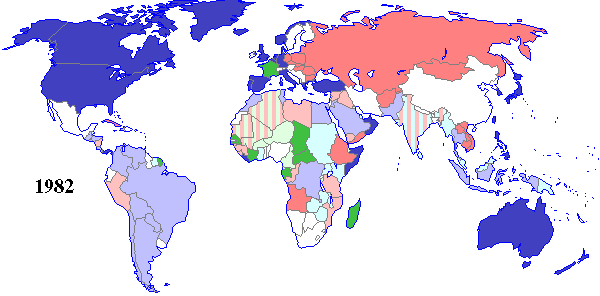


![]()

The alliance system began to unravel in 1959 when Communist insurgents came to power in Cuba, gaining their first foothold in the Western Hemisphere and setting off a chain reaction of crises which came very close to bringing about a full nuclear exchange between the superpowers. A more visible result of the various Cuban crises is that hemispheric unity was shaken as several Latin American countries, principly Mexico, decided that snubbing Cuba was not worth the risk and maintained diplomatic and economic relations despite the objections of the United States.
Meanwhile, the Soviets lost major ground in 1960, when China broke away after bickering over interpretations of Marxist doctrine, taking Albania and North Korea with them. China then tested its first atomic weapon in 1964 and withdrew from the world stage to indulge in the purifying ritual of the Cultural Revolution. About the same time, France decided that it didn't like its foreign policy being dictated by the United States, so it tested its first atomic weapon in 1960, and withdrew from NATO in 1965. Although it was almost certain that the French would be found on the American side in the event of a general European war, until then the French would pursue a foreign policy which was neither pro-Soviet nor pro-American but merely French.
A more substantial defeat for the Americans came with the fall of Indochina to the Communists in 1975. This region was not exactly vital to American interests, but because the United States had fought a major war to prevent this from happening, the stakes were high, and the defeat was horribly demoralizing. The replacement of the pro-American dictatorship in Nicaragua by Communist rebels also depressed American confidence, as did the the fall of the pro-American Shah of Iran in favor of a vehemently anti-western theocracy. In fact, because the Americans had begun the Cold War riding high with so many nations in its corner, just about every subsequent change of regime anywhere in the world sank American influence just a bit lower. By the mid-80s, it appeared that the US was clearly losing the Cold War.
Appearences were deceiving. While the Westen economies prospered despite the military buildups, the cost of maintaining a massive military machine was crippling the inefficient Soviet economy. The attempts at reform came to little, too late, and in 1989, the Soviets were forced to cut loose their East European satellites. In 1991, the constituent republics of the Soviet Union declared their independence and the Soviet Union ceased to exist altogether. The Cold War was over.
Last updated July 2000
Copyright © 1997-2000 Matthew White